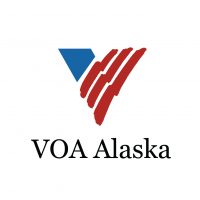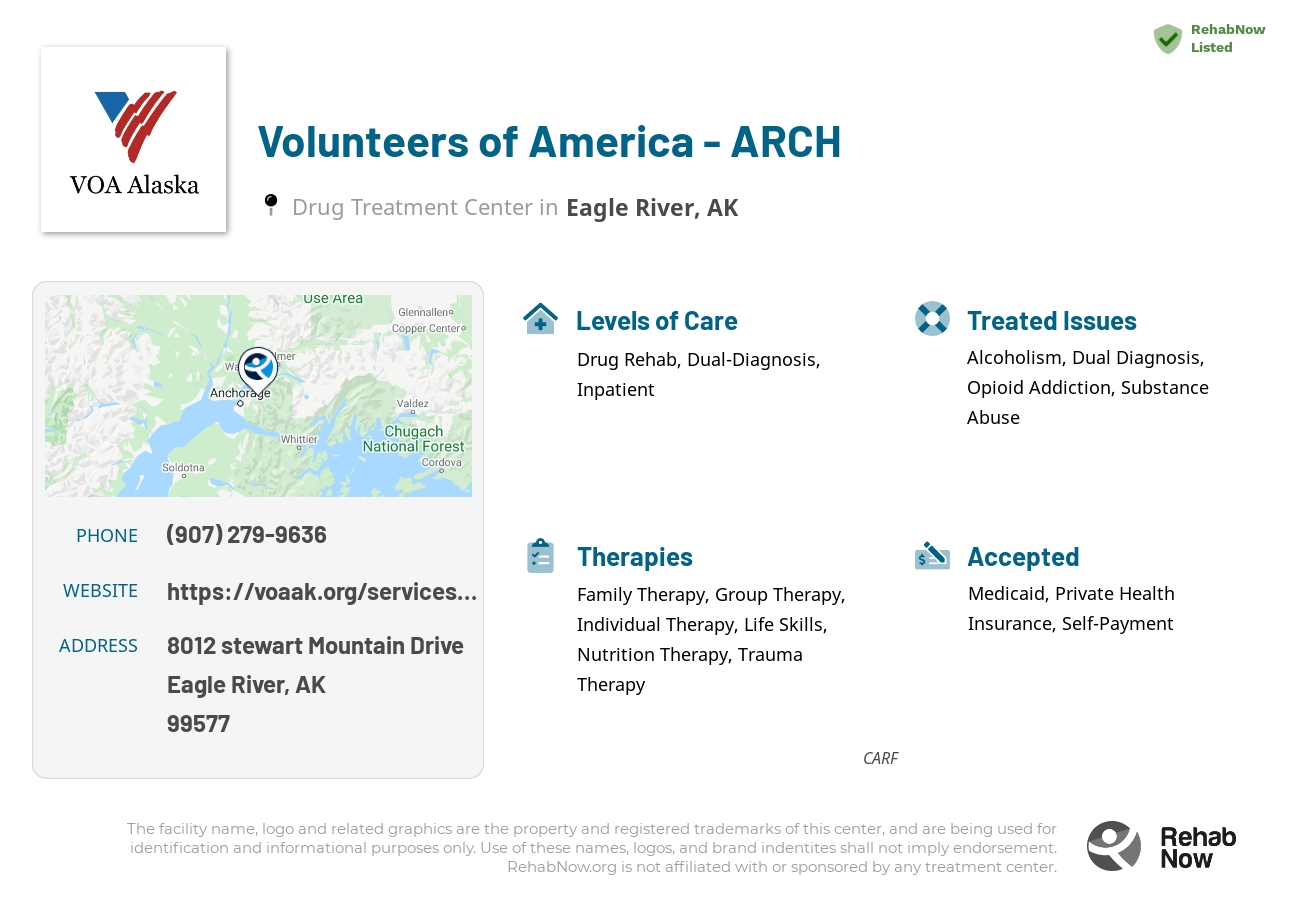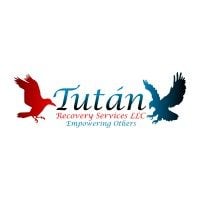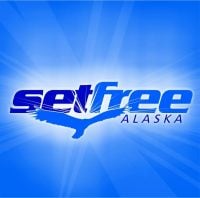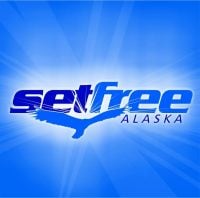Volunteers of America - ARCH
Drug Rehab Center in Eagle River, Alaska
Volunteers of America - ARCH in Eagle River, Alaska is a CARF-accredited addiction treatment facility offering personalized services and evidence-based treatment options for individuals suffering from alcoholism, dual diagnosis, and substance addiction, with a variety of levels of care, and accepts private health insurance.
About Volunteers of America - ARCH in Alaska
Volunteers of America - ARCH, situated in Eagle River, Alaska, is a specialized alcohol and drug rehab center catering to the 12 to 18 age group. With a capacity of 24 beds, this facility offers a comprehensive approach to overcoming substance addiction and dual diagnosis through a blend of residential treatment, partial hospitalization, and outpatient programs. Its unique approach integrates academic education and a strong emphasis on individual and group therapy, ensuring that clients can continue their schooling while on their recovery journey.
This facility is recognized for its high standards, holding CARF accreditation, which assures the quality of care and services provided. At Volunteers of America - ARCH, youngsters benefit from a supportive environment that includes psychological testing, psychiatric services, counseling, and around-the-clock medical support by nurse practitioners. The personalized treatment plans are designed to address substance use disorders and co-occurring mental health disorders effectively.
- Personalized treatment plans cater specifically to adolescents struggling with substance use and co-occurring mental health disorders.
- On-site educational programs allow clients to pursue their academic goals without interruption while undergoing treatment.
- A comprehensive approach that includes individual therapy, group therapy, and classes on addiction and recovery, supporting both mental and physical wellness.
Volunteers of America - ARCH focuses on treating substance use disorders and dual diagnoses, employing evidence-based treatment methods. The care levels available range from inpatient and outpatient services to partial-hospitalization, tailored to meet the individual needs of clients. Through a diverse set of therapies and educational support, clients are empowered to build a foundation for sustained sobriety and improved mental health.
Genders
Ages
Modality
Additional
Accreditations

CARF
The Commission on Accreditation of Rehabilitation Facilities (CARF) is a non-profit organization that specifically accredits rehab organizations. Founded in 1966, CARF's, mission is to help service providers like rehab facilities maintain high standards of care.
Conditions and Issues Treated
Many people need to recover from substance abuse to live a healthy life. In the end, if you can get through all the steps: detoxifying your body, rehabilitation after some time or when needed (depending on the type), and recovery while also receiving therapy support throughout the process, it can be worth it.
A detoxification center is a common place to start the recovery process from substance abuse. With your body and mind restored, you can continue to heal without the lingering effects of drugs.
Many people who struggle with opioid addiction need to attend specific programs like methadone , Suboxone or Vivitrol clinics.
These types of programs will provide the patient with legal, prescription medications that can help them overcome their cravings for illegal opioids like heroin or fentanyl . If the patient has a chronic condition like Hepatitis C, they must undergo treatment before they can begin taking these medications.
Dual Diagnosis is a specific relationship between two or more disorders that have the same symptoms and can sometimes be treated together. This is used in the treatment planning process when dealing with drug addicts. Dual diagnosis can be viewed as a chronic medical condition that has comorbid psychiatric disorders.
Although addiction and a mental illness may have separate symptoms that are not easy to detect, they often go hand in hand. Many times, drug abuse is a direct result of the mental illness. In other words, treating the addiction will not resolve all of your issues. Unless you also treat the underlying mental illness, you will not be successful in achieving sobriety.
Levels of Care Offered
This center offers a variety of custom treatment tailored to individual recovery. Currently available are Drug Rehab, Dual-Diagnosis, Inpatient, with additional therapies available as listed below.
Inpatient treatment is an intensive program that takes place when a patient checks into a rehabilitation facility. The treatment includes detoxification and counseling sessions, which are round the clock. Outpatient treatments are also available, but inpatient care is advised as the first step of rehabilitation.
Intensive rehab ensures the patient stays in a substance-free atmosphere, improving treatment success rates. The patient participates in group therapy for motivation from other patients who have overcome addiction. Family members are also involved in providing emotional support throughout the program.
Therapies & Programs
Individual Therapy is a critical component of addiction recovery. Therapists work with patients to identify the root of their addiction and figure out how to better handle the issues that led to them using drugs. Individual Therapy is the one-on-one session where people meet with their therapist. Individual therapy provides a safe space for people to open up and discuss personal and sensitive topics which they may not feel comfortable discussing in a group setting.
Family therapy will also help families realize that the addiction is not their fault. For many years, people blamed themselves for an addict’s behavior and felt that they had done something wrong. This is not the case. Addiction is a disease, and it can strike anyone, even if their life seems fine from the outside. It can bring a lot of shame to a family when they have an addict in their midst, but if everyone is open and honest with each other, then they can help everyone stay in recovery.
Group Therapy is utilized by drug treatment centers like Volunteers of America - ARCH to provide the recovering drug addict with a platform to talk about their feelings and experiences. It also provides for an opportunity to learn from other addicts who have successfully overcome their addiction.
Group Therapy is employed in lectures, seminars, or discussion groups (the latter two are typically conducted as “therapy groups”). It is recommended that all group members be recovering addicts for this type of therapy to work (though it does not exclude others with lived experience).
Trauma therapy is a clinical process that helps individuals deal with mental stress often caused by traumatic events. It is generally done for children, teenage victims of sexual assault, and war veterans. The therapist helps the person identify, understand and work through the problem. This is done with the help of talking about it in group or one-on-one counseling sessions. Therapists use relaxation, role-playing, art, and music to help the person open up about what is bothering them.
Training in improved life skills helps those recovering from addiction feel more capable of self-care. Volunteers of America - ARCH are daily skills that give the person the tools they need to survive.
The therapy covers practical activities like cooking, job hunting, social interaction, and money management, helping to fill in the knowledge gaps caused by addiction.
These life skills help the person self-manage their recovery and stay on track. It also reduces relapse risk as they gain confidence in their day-to-day abilities.
Nutrition therapy has been used to help drug addicts for decades. Many early reports on addiction treatment indicate that some patients recovered from the “satisfying power of food”. For years, this phenomenon has been utilized as a treatment modality in eating disorders for adults, adolescents, and children. Specific nutrients have been identified that influence neurotransmitters associated with reward pathways of the brain.
Studies have shown that carbohydrate loading with complex carbohydrates to elevate serotonin levels was effective in treating bulimia nervosa. This approach prompted researchers to explore the use of this type of nutritional intervention in other disorders.
Nicotine replacement therapy treats nicotine addiction using external sources of nicotine, such as patches or gum to substitute for nicotine. This allows people trying to quit smoking to get their desired dose of nicotine without actually having to smoke cigarettes. The idea behind NRT is that by providing smokers with nicotine in forms that are not cigarettes, they may be more likely to quit smoking.
NRT has been available for many years now, and there is a wealth of evidence that shows that it helps people trying to quit smoking. There are several different types of NRT devices on the market now. Patients interested in quitting smoking should talk to their doctors about the best kind of NRT for them.
Payment Options Accepted
For specific insurance or payment methods please contact us.
Is your insurance accepted?
Ask an expert, call (888) 674-0062
VOA Alaska Associated Centers
Discover treatment facilities under the same provider.
- Volunteers of America Alaska Assist in Anchorage, AK
- Volunteers of America - Anchorage in Anchorage, AK
Learn More About VOA Alaska Centers
Additional Details
Specifics, location, and helpful extra information.
Eagle River, Alaska 99577 Phone Number(907) 279-9636 Meta DetailsUpdated April 15, 2024
Staff Verified
Volunteers of America - ARCH Patient Reviews
There are no reviews yet. Be the first one to write one.
Eagle River, Alaska Addiction Information
Alaska is enduring a multi-faceted drug and alcohol abuse problem. Heroin-related overdoses are 50% higher in Alaska than in the rest of the United States. Methamphetamine use is a major contributing factor to violent crime in Alaska. More than 60,000 Alaskans need some sort of treatment for substance abuse and/or addiction.
Treatment in Nearby Cities
- Fort Yukon, AK (387.3 mi.)
- Barrow, AK (719.3 mi.)
- Nenana, AK (226.9 mi.)
- Valdez, AK (106.6 mi.)
- Soldotna, AK (75.5 mi.)
Centers near Volunteers of America - ARCH
The facility name, logo and brand are the property and registered trademarks of Volunteers of America - ARCH, and are being used for identification and informational purposes only. Use of these names, logos and brands shall not imply endorsement. RehabNow.org is not affiliated with or sponsored by Volunteers of America - ARCH.
